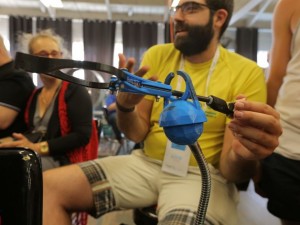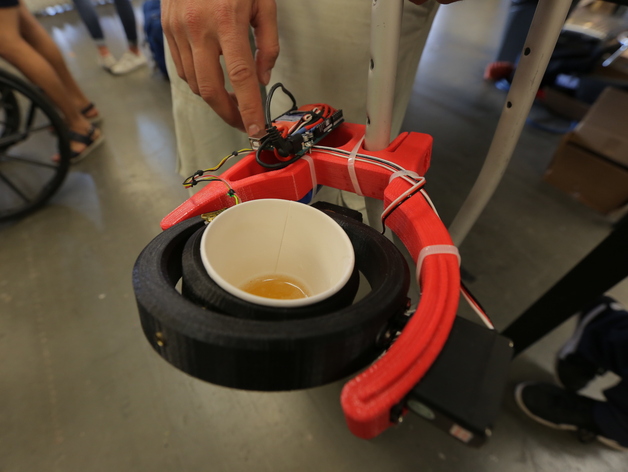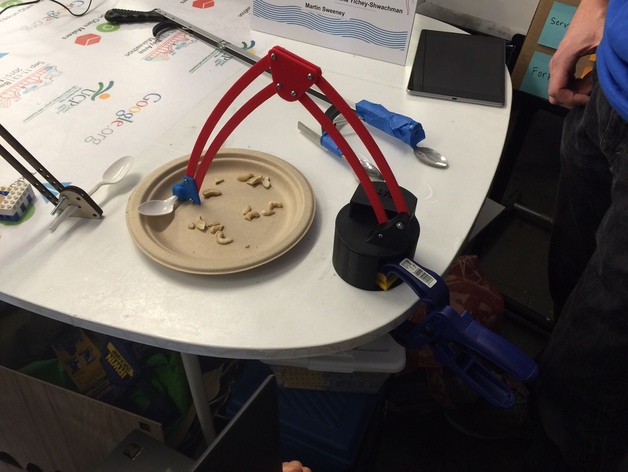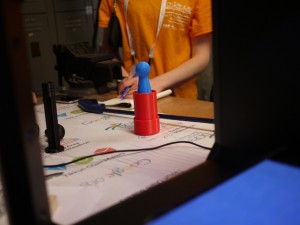Earlier this September, bright minds belonging to 3D print-savvy engineers, designers, and makers joined together at the TechShop San Francisco for the 2015 Bay Area Makeathon, where multiple teams stemming from the enormous Makerbot Thingiverse community worked to produce innovative and affordable assistive devices to help aid various disabilities that unfortunately sometimes plague more underserved communities. After the competition was all said and done, MakerBot has announced a Thingiverse-based contest called the Assistive Technology Challenge, which calls upon the 3D printing online community to redesign and improve upn the top five assistive device prototypes selected at the Bay Area Makeathon. The original competition, which was run in collaboration between MakerBot and Tikkun Olam Makers, has led to some truly unique assistive device designs. Let’s take a closer look at the top prototypes selected for the Assistive Technology Challenge, who knows, maybe you’ll have something to contribute to the design!

–Grabber: The Grabber was developed for the ‘need knower’ Kim Lathrop, a member of Team Grabber who happens to be without arms. Lathrop was looking for a device to assist her with performing physical activities, and so the Grabber was prototyped as a device that can help the disabled user grab and move objects via their mouth. Lathrop has high praise for their assistive device, “This device helps me do things myself, which is a basic human desire. There are so many things I’ll be able to do now, like setting a table for guests,” she said.
–Carry Crutches: One team developed the Carry Crutches to assist those using crutches to get around to hold things efficiently while they do so. The 3D printed cupholder was designed to attach to a crutch, giving an extra hand to those being supported by inconvenient crutches. The team designed both a mechanical version composed only of 3D printed parts and ball bearings (material cost:~$15), and also produced an electronic version including Rasberry Pi and servo motors (material cost:~$30).

– Smart Ass: Another team involved in the MakerBot and TOM created the Smart Ass, a 3D printed frame equipped with sensors that is designed to monitor the potential health issues that come with being regularly confined to a wheelchair. The sensors within the 3D printed mount will manage weight distribution of the wheelchair user, and will then send that acquired data to a smartphone app to help prevent pain, sores, and other risks.
–iEat: Independent Feeder: The iEat prototype was designed as an affordable alternative to usually expensive feeding assistive devices required by those with limited hand function. The iEat: Independent Feeder was manufactured out of just a few simple 3D printed parts, and is aiming to offer the disabled community a low-cost device to help aid the struggle that people with limited function within their hands often experience while eating with this simple, yet efficiently designed solution.


–Pill Crush: Many people, whether they are experiencing a disability or not, have trouble consuming large and intimidating medication, which led the final selected prototype, the Pill Crush, to be selected by judges as an innovative assisted device. The device was prototyped to act as a portable medicine grinder that is able to function as a syringe as well. Helping those disabled individuals who have problems with medication intake an reliable and cheap alternative.
As you can see, each of the selected assistive device prototypes satisfies their own niche in the industry of disability solutions. MakerBot and TOM have taken this seemingly successful Makeathon competition and have created a new challenge to put these ideas out into the world via Thingiverse, where their global community of 3D printing enthusiasts can further improve and innovate these prototypical designs. If you’d like to join in on the Assistive Technology Challenge, the competition will be open on Thingiverse until November 1st, 2015.


